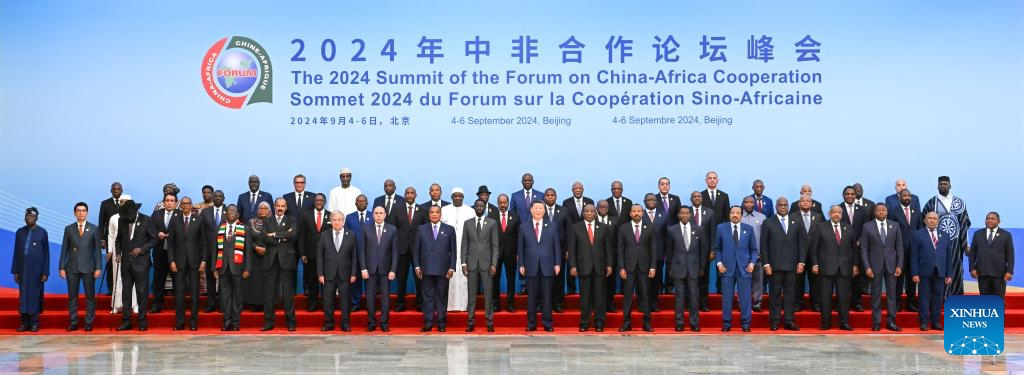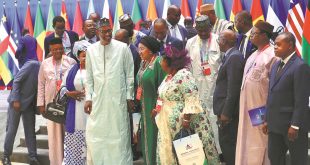Published: September 09,2024

Chinese President Xi Jinping and foreign leaders gather for group photos prior to the opening ceremony of the 2024 Summit of the Forum on China-Africa Cooperation (FOCAC) at the Great Hall of the People in Beijing, capital of China, Sept. 5, 2024. Xi on Thursday attended the opening ceremony of the 2024 Summit of the Forum on China-Africa Cooperation (FOCAC) and delivered a keynote speech. (Photo: Xinhua)
As an African proverb goes, “a friend is someone you share the path with.” In the shared pursuit of modernization of the Global South, China and Africa have stood together as companions over the years.
Themed “Joining Hands to Advance Modernization and Build a High-Level China-Africa Community with a Shared Future,” the 2024 Summit of the Forum on China-Africa Cooperation (FOCAC), which attracted over 50 African leaders, highlighted the common pursuit of China and African countries in realizing modernization.
MONUMENT OF FRIENDSHIP
The China-Africa community with a shared future is deeply rooted in the traditional friendship between the two sides. During the 1970s, a pivotal period for the economic development of Tanzania and Zambia, some 50,000 Chinese workers and engineers came to help construct the Tanzania-Zambia Railway. In the past five decades, 70 Chinese engineers, technicians, and workers lost their lives in railway construction, technical cooperation, and other projects in Tanzania. To honor their contributions, a monument has been erected at the Gongo la Mboto cemetery in Tanzania. The 1,860-km-long railway serves as a reminder of the longstanding relationship between China and Africa. As time passes by, the China-Africa friendship remains robust and grows stronger no matter how the world changes.
Issa Fatimoh Abiola, Nigeria’s first female train driver, has worked with China Railway Construction Corporation (CRCC) for 16 years. Reflecting on Chinese President Xi Jinping’s keynote speech on modernization at the opening ceremony of the 2024 FOCAC Summit, she recalled CRCC’s significant contributions to Nigeria’s modernization. “The CRCC has been deeply involved in Nigeria for 43 years, contributing tremendously to the country’s transportation and infrastructure modernization,” Abiola said. “Since joining the company in 2008, I have witnessed the successful implementation of numerous landmark projects, including the Lekki Free Trade Zone, Abuja-Kaduna Railway, Lagos-Ibadan Railway, Abuja Light Rail, Lagos Blue Line, as well as ‘small and beautiful’ livelihood projects that directly benefit people’s livelihoods.”
Victoriah Mukiri, the legal adviser for China Railway No.10 Engineering Group Co., Ltd, has worked with the company for 17 years. Touched by Xi’s remarks on “jointly advance modernization that is open and win-win,” Mukiri noted how her company expanded from a few projects to multiple regional ventures in Kenya, ranging from highways to municipal, housing, and mining construction. The company has trained batches of technicians, created thousands of jobs, and significantly improved Kenya’s infrastructure.
As President Denis Sassou Nguesso of the Republic of Congo said at the opening ceremony of the 2024 Summit of the FOCAC, “China remains an all-time friend.” He added that Africa and China are drawing closer through shared history, values and solidarity, and their joint modernization efforts reflect a mutual commitment to prosperity and peace.
TWO-WAY EFFORTS
“We have together built roads, railways, schools, hospitals, industrial parks, and special economic zones. These projects have changed the lives and destiny of many people,” Xi said at a welcome banquet held at the Great Hall of the People for summit attendees Wednesday, noting that the China-Africa community with a shared future thrives on the strength of win-win cooperation. This cooperation is driven by development projects with Chinese companies playing an increasing role in bolstering Africa’s industrialization. One notable example is the Sapphire Float Glass Factory in Tanzania’s coastal region, which serves both the local market and exports to six other African countries. With a designed production capacity of approximately 700 tonnes per day, the factory has created 1,012 direct jobs for locals and 3,857 indirect jobs since its inauguration in September 2023. Once fully operational, it is expected to provide 1,650 direct and 6,000 indirect jobs.
“China’s imprints are evident and vivid in infrastructure improvement, rapid industrialization and all progress in small and medium-sized enterprises in our countries,” Tanzanian President Samia Suluhu Hassan said at the opening ceremony on Thursday. “Our presence here today reflects the solidarity and commitment to building a shared future of progress and prosperity,” she said, calling on African countries to work with China towards fruitful socio-economic innovations and development.
In Botswana, Chinese firms are playing a key role in the country’s green energy transition. In August, Botswana Power Corporation signed a power purchase agreement with Sinotswana Green Energy, a consortium of Chinese and Botswana companies, to officially launch the nation’s first 100 MW solar photovoltaic power plant. The project, expected to begin operations by the end of 2025, has been hailed a “key milestone” in the country’s energy transition.
Driven by the Plan for China Supporting Africa’s Agricultural Modernization, China-Africa agricultural cooperation has also flourished, yielding notable results in technical assistance and training for agricultural experts, the transfer of advanced technologies, the establishment of agricultural parks, and the promotion of farming projects for Juncao and hybrid rice. This cooperation has advanced Africa’s agricultural modernization. “Agricultural modernization ensures high-level productivity. It reduces the risk of disease and lowers the cost of production. That’s the way African countries should go,” said Nabwera Daraja Nabii, a member of the National Assembly of Kenya.
China has shared its expertise in Juncao technology and hybrid rice cultivation, training over 14,000 people and introducing these techniques to many countries, benefiting millions of farmers. Dozens of countries across the globe have engaged in research and demonstration planting of hybrid rice, with nearly 8 million hectares planted abroad annually.
Over the past decade, China has established 24 agricultural technology demonstration centers in Africa and introduced more than 300 advanced agricultural technologies, increasing local crop yields by an average of 30 to 60 percent and benefiting over 1 million farmers across the continent. “We hope that China can work very closely with us so that we can feed the world,” said Thomas Tayebwa, Ugandan Deputy Speaker of the Parliament. “Africa can be the food basket for the rest of the world.” Talent development is also vital for both China and Africa as they work to improve their economies and livelihoods, making educational collaboration a cornerstone of China-Africa relations.
China has established 17 Luban Workshops in 15 African countries, providing training to help young African youths secure jobs in Chinese-invested enterprises. Over 220,000 Africans have been trained by China, with tailored programs to meet the specific needs of each country. Under the Plan for China-Africa Cooperation on Talent Development, China aims to train 500 principals and vocational teachers, as well as 10,000 technical personnel with both Chinese language and vocational skills for Africa every year. This talent cooperation is expanding into sectors like digital industries and healthcare, enabling more African youths to pursue their dreams.
“Vocational and technical education is very important in the 21st century. What you can do depends on the training that you have, and the training that you have depends on the kind of institutions you attend,” said Prof. Kabiru Bala, Vice-Chancellor of Ahmadu Bello University of Nigeria. “Africa is a young continent because we have a large percentage of young people. Our task now is to see that these young people are empowered in terms of skills and competence that can move our developments,” said Prof. Olusola B. Oyewole, secretary general of the Association of African Universities of Ghana.
NO ONE SHOULD BE LEFT BEHIND
“On the path to modernization, no one, and no country, should be left behind,” Xi said in his keynote address at the opening ceremony of the 2024 Summit of the FOCAC. The joint pursuit of modernization by China and Africa will set off a wave of modernization in the Global South, and open a new chapter in the drive for a community with a shared future for mankind. “China’s partnership with the African continent is the main pillar of South-South cooperation,” said United Nations Secretary-General Antonio Guterres while addressing the 2024 Summit of the FOCAC. “Your joint efforts, based on the United Nations Charter, can create a new momentum for African development.”
The China-Africa partnership can “drive the renewable energy revolution,” and be “a catalyst for key transitions in food systems and digital connectivity,” said Guterres, noting that Africa can maximize the potential of China’s support in areas from trade to data management, finance and technology.
Isaura Diez, a journalist with Cuba’s Prensa Latina news agency, covered the 2024 Summit of the FOCAC in Beijing. She believes that Latin America can take China-Africa cooperation as a “sample,” and that all Global South countries should amplify their voices together. “The FOCAC Summit shows us what kind of collaboration and agreements we can establish as a continent with China,” Diez said, adding that “raising China-Africa relations is a magnificent precedent for other regions of the world such as Latin America and the Caribbean. We can work together despite differences based on mutual respect, peaceful coexistence and non-interference in each other’s internal affairs.”
The FOCAC summit aims to build consensus on how China and African countries can cooperate to unlock the potential of industrialization, agricultural modernization and youth talent development. As long as the 2.8-billion-strong Chinese and African people are united, “we will accomplish new and even greater feats together on the way toward modernization, spearhead the modernization drive of the Global South, and make greater contributions to a community with a shared future for mankind,” Xi said on Wednesday at the welcome banquet. “I am eager to join the movement for modernization of the Global South. I firmly believe that when we unite and work together, there is nothing we cannot accomplish,” said Abiola, the first female train driver of Nigeria.
She said that through coordinated development, people can fully leverage the vast resources of the Global South. “By effectively harnessing these assets to drive economic growth and improve living conditions, I am confident that the future will be filled with hope and opportunity,” she said.
Xinhua
 Africa -China Review Africa -China Cooperation and Transformation
Africa -China Review Africa -China Cooperation and Transformation
